Healthy Ageing
Alien van der Sluis
My dream is for every child to grow up in a healthy and stimulating environment. I am contributing as a boundary researcher, bringing together scientific, professional and experiential knowledge. I am experienced in design-based research approaches and have co-developed several interventions on stimulating active healthy lifestyle and self-regulation of children and adolescents from within the school context. Currently, my work consists of developing and evaluating Tijd voor Toekomst (Time for Future), a program for enriched schooldays for children in the province of Groningen with the ambition to create equal chances for growing up healthy and with a promising future. I have a PhD in Human Movement Sciences and work as a senior researcher for the Institute for Sport Sciences at the Hanzehogeschool.
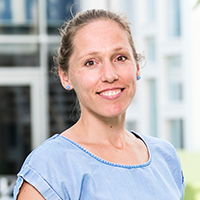
Aleid Brouwer
I am Aleid Brouwer, I work as a lecturer at the Faculty of Spatial Science at the University of Groningen and as a full professor at the NHL Stenden University of Applied Science in Leeuwarden. My Aletta research focusses first on ‘housing solutions for an aging population’; answering questions such as where do older adults want to live, what kind of whishes do they have, can they afford to age in place, are they prepared to age in place, do they have the social network to age in place? The second focus is on ‘who cares for the informal care giver’, what are the effects of the participation society for elderly and for the people who will do the caretaking, What are the effect for the caregiver on the long term, in work life balance, career perspectives and health and how can employers take care of their employees that might be overburdened.
Extra keyword: Informal Care
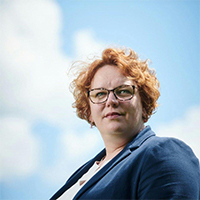
Bertus Jeronimus is a developmental and clinical psychologists who studies the co-development of personality, happiness, and internalizing problems over the lifespan. Key interest are personal strengths and vulnerabilities, emotions, the socioecology in which one lives and grows (especially intimate support relationships - family/friends/partners), daily activities, stressful life events (including the coronavirus pandemic), the role of culture and history, personal narratives, and psychiatric taxonomies.
Extra keyword: Personality
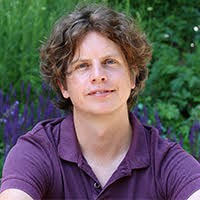
Han de Ruiter
As of April 1, 2019, I started as a professor in the research domain Value Based Health Care. In the ever-changing healthcare domain, we see that the value(s) of healthcare is becoming more important. That means value for the patient involved, his or her family and the social network. But also value for healthcare professionals. From our university of applied sciences perspective, this mainly concerns the nurses and para medical professions. On the one hand, we look at the care processes and the effective and efficient working method therein and efficient use of (financial) resources. On the other hand, we try to take the perspective of the patient as a starting point in our research. What does value-based care mean from the perspective of the patient, the family, the social network?
Extra keyword: Value Based Healthcare
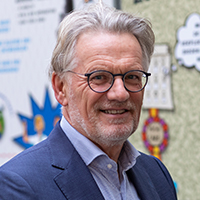
Louise Meijering
Louise is associate professor in Health Geography and is leading a research programme on Well-being, mobility and attachment to place in later life. Her key contributions to the field have been on the outdoor mobility of older adults; place and identity after stroke; and the multi-dimensionality of well-being in later life. Her work is interdisciplinary, at the intersection of geography, gerontology and public health. Currently, she is leading an ERC-funded project called Meaningful Mobility, in which she aims to develop a novel approach to in- and outdoor movement in later life, in the Netherlands, United Kingdom and India.
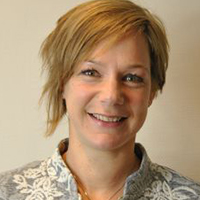
Susan Ketner
Susan Ketner has served as professor of Comprehensive Approach to Child Abuse at Hanze University of Applied Sciences Groningen as of 1 March 2019. Her specific background as a researcher is in diversity, parental support and parenthood. She is keen on using her professorship to improve parental support in families where parents face various types of pressure and where concerns over safety exist. In doing so, she prefers to link up research, education, policy and practice.
Extra keyword: Parenthood
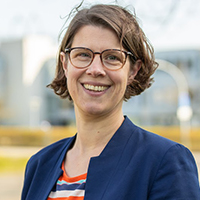
Klaske Veth
Klaske Veth PhD is a professor in Sustainable HR at Hanze University of Applied Sciences in Groningen. She obtained her PhD at the Radboud University in Nijmegen on the theme Healthy Aging@Work (nominated for best dissertation at International HRM conference). She worked in various (managerial) HR positions and sectors. At the University of Utrecht she completed the postgraduate program Coaching and Consulting in Context. She has completed her initial study Management & Organizational Sciences ('with pleasure') at the University of Tilburg. Within her professorship Klaske Veth focuses on the research lines Well-being@Work (W@W) and Leadership containing topics such as (social psychological) HRM, work engagement, healthy aging, and (personal) leadership. She also gives lectures in (post-) bachelor's and master's degree programs and supervises graduates. She has published in various (inter) national (scientific) journals and presented at (scientific) conferences (inter)nationally.
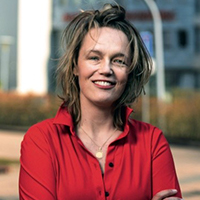
Remo Mombarg
dr. Remo Mombarg is a Lector Physical Education (PE) and youth sports at the Hanze University of Applied Sciences. The main goal of this lectorship is to develop knowledge about effective interventions that make children sport, in a pleasant, healthy, and sustainable way. How do we prepare children for a life in sports? Remo has extensive experiences in sportdevelopment for children in vocational education. Recently a project called “selfregulation in sport and health” was funded by the NRO (Dutch council for research). In this project students, researchers, and PE-teachers perform this research, in so called ‘knowledge-working-places’. For children with motor coordination difficulties, such as children with Developmental Coordination Disorder (DCD), we focus on a strong learning environment, that stimulates children to trust their bodies and to enjoy to be physically active. This interaction between students, teachers/researchers, PE-teachers, and children, is highly fruitful for all parties. Children receive extra attention from up-to-date students – who learn to work with less capable children, teachers/researchers can perform their research on-the-job, and PE-teachers see their children grow. This cooperation resulted in many products such as curricula,1
a book chapter,2 television parts,3
and several articles, e.g. on Serious Gaming4,5. Further, one of our colleagues wrote her PhD-thesis on DCD6
and supervises graduate students in their research on, for example, the effects of implicit and explicit learning strategies in children with motor coordination difficulties.
The collaboration between students, teachers/researchers, PE-teachers, and children pays special attention to children with motor coordination difficulties, to help them find a way into sports and to receive compliments, because all children deserve to joyfully participate in sports.
Extra keyword: Physical Education
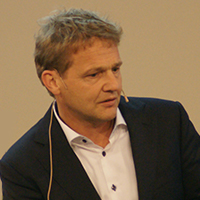
Jenny van Doorn
My name is Jenny van Doorn, I'm professor of Services Marketing at the Faculty of Economics and Business, University of Groningen. My research focuses on the use of technology in services, in particular the use of robots and artificial intelligence. Use of such technology becomes also more and more common in healthcare and is seen as a potential solution for the challenges that the health care system faces given the increasing health care demand due to ageing populations and personnel shortages. The current generation of technological devices often already goes beyond a mere functional role and also engages its user on a social level, such as a robot doing physical exercises with the elderly or devices using speech technology to remind their users to e.g. take their medicine. In my research I explore how consumers react to such technology, and whether there are ways to overcome reluctance that in particular elderly people may feel to use it.
Extra keyword: Robots and chatbots in healthcare
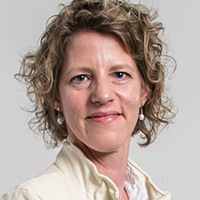
Jan-Jaap Reinders
Dr Jan-Jaap Reinders is a Dutch work and organizational psychologist specialized in research on interprofessional identity and sociotechnical systems approach to interprofessional collaboration. He works at the Hanze UAS, the University Medical Center Groningen, and is affiliated as Principal Investigator of the Research Group on Interprofessional Identity and Collaboration with Kaunas UAS in Lithuania. In addition, Dr Reinders is a copromotor of several PhD candidates and an association board member of Interprofessional.Global. He developed a new scientific theory on interprofessional identity – extended professional identity theory – and a psychological instrument to measure interprofessional identity (EPIS; extended professional identity scale). So far, EPIS has several cross-cultural validated versions: Lithuanian, German, and Turkish.
Extra keywords: Interprofessional education, collaborative practice, interprofessional identity, sociotechnical systems approach
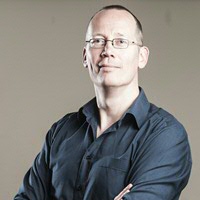
Hans Hobbelen
Hans Hobbelen (PhD, PT) started his career as a physiotherapist in a nursing home in the city of Eindhoven the Netherlands and stayed at this job for 22 years. In 2001, he received his master degree in human movement sciences. He received his PhD in 2010 on the topic of paratonia, a distinctive form of hypertonia in dementia. This made him a leading scientist in the field of paratonia and movement disorders in dementia. He is since 2012 professor (Lector) in Ageing and Allied Health Care at the Hanze University of Applied Sciences in Groningen, The Netherlands. Besides movement disorders in dementia his main field of interest is frailty, in specific the multi-dimensionality of Frailty. Hans is pioneer of FAITH Research (funded by SIA-SPRONG). FAITH is the abbreviation of Frailty by Assessment, Intervention and Technology towards Health and entails the development of an infrastructure of research on frail and vulnerable populations. The FAITH consortium is a consortium of the professorships of the northern Universities of Applied Sciences (Hanzehogeschool and NHL-Stenden) with expertise on frail elderly and 25 partners ranging from care organisations, SMEs and health insurers.
Furthermore Hans is member of the scientific board of the Dutch physiotherapy association (WCF, KNGF), member of the Clinical Consortium on Healthy Ageing of the World Health Organisation (WHO) and since may 2019 President of The International association of Physiotherapists working with Older People (IPTOP, official subgroup of WCPT)

Jetse Goris
Together with his colleagues, Jetse has pioneered a human centered design approach to innovating health care and medical education at the University Medical Center of Groningen. This culminated in the founding of the UMCG innovation support Center. For Aletta he was part of the team that developed and executed the minor More Healthy Years, Innovating Public Health and the Aletta Regional Year Challenge. He currently works at the Master Design Driven Innovation at NHL Stenden. In his spare time he loves playing drums and wathing birds.
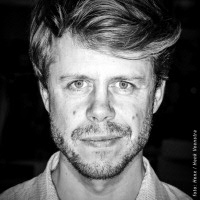
Annelieke Roest
Annelieke Roest is assistant professor at the Department of Developmental Psychology, Faculty of Behavioural and Social Sciences at the University of Groningen. Her research themes include the epidemiology of mental disorders, more specifically anxiety and depressive disorders, and healthy ageing. She has a profound interest in the (bidirectional) associations between somatic diseases and mental health problems. She uses different research methods to answer her research questions, including systematic review and meta-analysis, involving close attention to publication/reporting biases. Examples of studies she is involved in are the Lifelines cohort study and the World Mental Health surveys.
Extra keywords: systematic review and meta-analysis
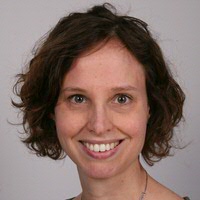
Marjon de Vos
Marjon de Vos is Assistant Professor at the Groningen Institute for Evolutionary Life Sciences (GELIFES) at the Faculty of Science and Engineering. She investigates ecological and evolutionary processes in (infectious) microbial communities. Her research group aims to understand the genotype-phenotype-fitness relationships within (evolving) microbial communities, and aims to elucidate the ecological drivers of evolution. We study these eco-evolutionary processes in the 'Evolutionary Medicine' realm, using molecular biological tools, by performing phenotypic and growth measurements, and modeling. By unveiling the fundamental ecological and evolutionary microbial processes in infectious disease, we hope to improve and contribute to strategies that can alleviate infectious diseases and limit the spread of antibiotic resistance.
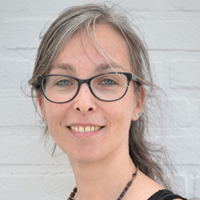
Sandra Jorna-Lakke
I am a postdoc researcher and senior teacher in the field of communication in health care, especially in physical therapy. My key interest is improving communication in physical therapy practice in which I worked 25 years. At this moment I lead a national project aimed to improve communication in physical therapy practice, especially in patient with lower health literacy and chronic complaints, and I coordinate a European project aimed to develop interprofessional learning materials for universities and health care practice.
Extra keywords: Communication; physical therapy; interprofessional education

Merit Hondelink
Merit Hondelink is a trained archaeobotanist and historian. She is a PhD-candidate working on her NWO-funded research titled: A taste of historic cookery: a reconstruction of the daily meal as prepared by common burghers of Early Modern Dutch cities, AD 1500-1850. The main aim of her research, supervised by René Cappers (Groningen University) and Bruno Blondé (University of Antwerp), is to expand our knowledge of the past food and alimentary practices of the common Dutch burgher. The central question that will be addressed in her research is: what did common burghers of Early Modern Dutch cities eat, how did they prepare their daily meal and how did these food and alimentary practices change through time? In order to contribute to the development of a better understanding of this topic, Merit adopts a multidisciplinary approach and compares and integrates the information obtained from bio-archaeological, historical and gastronomic (experimental cooking) research.
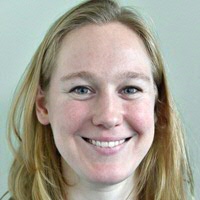
Harriët Jager-Wittenaar
Harriët Jager-Wittenaar, PhD, RD, is Professor of Malnutrition and Healthy Ageing within the Research Group Healthy Ageing, Allied Health Care and Nursing at the Hanze University of Applied Sciences and senior researcher at the Department of Oral and Maxillofacial Surgery at the University Medical Center Groningen. She is also appointed as Guest Professor and Honorary Fellow at the Vrije Universiteit Brussel, Belgium. Moreover, she is co-program leader of FAITH research (www.faithresearch.nl), a network of more than 40 healthcare organizations, knowledge institutions and companies that generates and shares knowledge on frailty. With a dietitian background, her research program focuses on prevention and treatment of malnutrition and sarcopenia in patients with chronic diseases and older adults. In specific, her research program is aimed at development and validation of innovative methods for nutritional assessment (including body composition assessment), implementing proactive and interprofessional nutritional risk screening and treatment of malnutrition across the various health care settings, and the relationship between malnutrition and frailty. Dr. Jager-Wittenaar was former Lead of the European Specialist Dietetic Network (ESDN) for Older Adults, an expert committee within the European Federation of Associations of Dietitians (EFAD), and was member of the former Global Leadership Initiative on Malnutrition (GLIM) Validation and Testing Working Group. Currently, she is co-lead of the GLIM Implementation Working Group, and current Chair of the EFAD-ESPEN Working Group within EFAD.
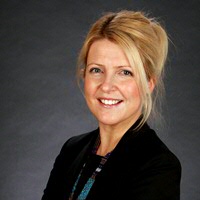
Margreet Luinge
Margreet Luinge, PhD, RD is Professor of Language Function & Healthy Ageing. Her research focuses on language development, prevention developmental language disorders in children and delaying language degeneration in elderly. In 2002 she obtained her degree in neurolinguistics at the University of Groningen. In 2005 she obtained her doctorate for the development of the language screening instrument Speech and Language Standards Primary (SNEL) at the Medical Sciences of the University of Groningen, for which she received two prizes. Margreet is a member of the national science council of the Dutch Association for Speech Therapy and Phoniatrics.
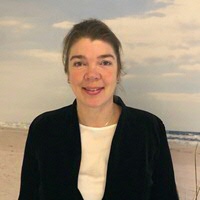
Ingeborg van der Meulen
Ingeborg van der Meulen, PhD, RN, is postdoc researcher and teacher within the professorship Nursing Diagnosis at the School of Nursing, the Hanze University of Applied Science in Groningen and at the Department of Critical Care, University Medical Center Groningen. Together with her colleagues, she works on the Follow-up Intensive Care Studies (FICS) which focus on the long-term impact of an ICU admission for ICU survivors and their family members. The goal is to identify patients and family members who are at high risk of long-term impaired physical, psychological, spiritual and social well-being. In addition, we explore which interventions can be effective to support ICU survivors and their family members in regaining their quality of life after ICU admission. Key to the research is that we work with an interdisciplinary team of nurses, medical doctors, health care chaplain, students and PhD-students. In addition, research and education is combined to improve clinical outcome for patients and their family members. Divers research designs are used, for example systematic literature review, qualitative research with storytelling or semi structured interviews and cohort studies.
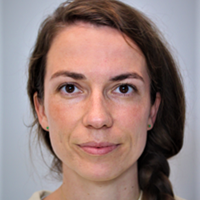
Aly Waninge
My name is Aly Waninge (PhD, PT). The overarching goal of my research is to gain scientific knowledge to optimize support for people with intellectual and visual disabilities to improve their participation, lifestyle and health. In line with my professional background as a physiotherapist, I am supervising research projects focusing on the development of interventions, screening and measurement instruments regarding exercise, lifestyle, health, and participation.
I am Professor Participation and health of persons with intellectual and visual disabilities within the Research Group Healthy Ageing, Allied Health Care and Nursing at the Hanze University of Applied Sciences in Groningen. Also, I am co-program leader within Health Psychology Research at the University Medical Center Groningen. In addition, I am member of the management team of the Academic Collaborative Center related to people with profound intellectual and multiple disabilities. Our research has a major impact on supporting this vulnerable group in practice, due to the strong knowledge infrastructure that has been set up within this center. An important topic of my research, healthy lifestyle, is addressed within the Innovation Lab Active Ageing of people with intellectual disability , where research and knowledge transfer are performed. This collaboration between health care organizations that support people with intellectual disabilities in Groningen, Drenthe and Friesland and our research group, is part of FAITH research .
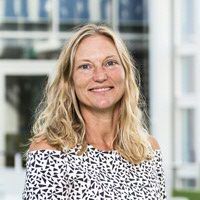
Marianne Nieuwenhuis
Dr. Marianne Nieuwenhuis studied Human Movement Sciences at the University of Groningen and did her PhD at the Wilhelmina Children’s Hospital in Utrecht. Since the realisation of the Association of Dutch Burn centres in 2003, she is head of its Clinical Research Program and research coordinator at the Burn Centre of the Martini Hospital. In 2020 she also became professor (lector) in Recovery of functioning and quality of life after burns, at the Hanze University of Applied Sciences in Groningen, The Netherlands. Her research focusses on physical fitness and activity, to help meet the challenge of burn care of how best to enable people who have sustained a burn injury to return to their pre-injury status of functioning, or as close to it as possible. Her professional interests are in the areas of burns, (physical) functioning, rehabilitation, biomechanics and clinical research. Besides research, she enjoys training students (bachelor, master, PhD) and working together with health care professionals and researchers from a variety of disciplines and experience experts, as well as teaching.

Wim Dieperink
Wim Dieperink is Clinical Research Coordinator at the Critical Care department of the University Medical and professor of Critical Care at the Hanze University of Applied Sciences Groningen.
Critically ill patients are entitled to the best possible treatment based on available evidence and knowledge. The patient is at the center of clinical work and medical education, and so is research. It is our moral and academic duty to conduct excellent research that benefits critically ill patients around the world. The aim is to establish a deepened collaboration within the healthcare sector in the North of the Netherlands to improve 24-hour care for critically ill patients, by contributing to innovation, adoption of new methods and techniques, research and educational development.
It is my mission to:
- provide the best available treatment and care to patients requiring intensive care;
- being part of a learning and innovative organization;
- create a pleasant working environment.
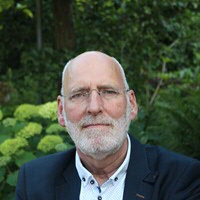
Jeanet Landsman
Dr. J.A (Jeanet) Landsman is head of the section Applied Health Research (Toegepast Gezondheids Onderzoek) of the department of Health Sciences, University Medical Center Groningen. Her dissertation (2005) was titled ‘Building an effective short health promotion intervention; theory driven development, implementation and evaluation of a body awareness program for chronic a-specific psychosomatic symptoms’.
Dr. Landsman’s research interests’ societal participation and prevention of illness of vulnerable groups in society, for instance individuals with autism with or without an intellectual disability, chronic pain patients, patients with Long-COVID, people who are at risk for developing or have NCD’s, individuals who have or are at risk for a burn out and older people with low health literacy.
Jeanet has a background in Physiotherapy and Movement Sciences, and she is an expert in participatory action research and implementation research. She organizes and collaborates in learning communities with citizens, (healthcare-) professionals, scientific researchers, NGOs and government organizations. She managed several international and national research projects, funded by for instance EU or ZonMw and is daily supervisor and co-promotor of several PhD-students. One project led to the development of Werk Web Autisme for people with autism to find and keep work and another project about balancing sensory processing for people with autism and an intellectual disability. She is also working on a EU-funded project about Scaling Up NCD-Interventions in South East Asia.

Marline Lisette Wilders
Marline Lisette Wilders is Assistant Professor in Arts in Society at University College Groningen and the Department of Arts, Culture and Media at The Faculty of Arts. She specialises in empirical research methods, more specific in audience and reception research, studying aesthetic experiences in relationship to the experience of space and place. In 2013 she received a 2-years Rubicon grant from the Netherlands Organisation for Scientific Research (NWO) for the project From Working Space to Theatre Space: the user perspective, on the effects of adaptive reuse of industrial heritage sites for the functioning of the performing arts and built industrial heritage in society. A second post-doc period concerned the uses and re-uses of different types of heritage through the study of jazz and improvised music festivals, within the project Cultural Heritage and Improvised Music in European Festivals (CHIME), which was funded by the European Union. Currently she is second year coordinator of the Research Master Cultural Leadership where she also teaches research methods for Social Sciences and Humanities. At UCG she teaches Artivism, Visual and Arts Based Methods and gives project-based education. For the Aletta Jacobs School of Public Health she teaches in the interdisciplinary minor More Healthy Years since the start of this minor, which she also helped to develop. In 2022 she will start as Community of Expertise Leader Interdisciplinary teaching for employability, lifelong learning and citizenship for the Teaching Academy Groningen. Moreover she is part of the recently started Enlight Quali co-ordination team of lecturers in qualitative research.
Extra Keyword: Arts based methods and health
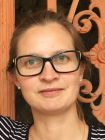
Hans Drenth
Hans Drenth (PhD, PT) is professor (lector) of “Short-term care and interprofessional collaboration in frail older people” in the research group “Healthy ageing, Allied Health Care and Nursing” at Hanze University of Applied Sciences Groningen. His research focuses on effective strategies for short-term admission, such as geriatric rehabilitation care, geriatric-psychiatry and/or specialized care from the nursing home for older people living at home. The aim of this is to allow (pre) frail older people to continue living at home longer and, above all, better while retaining functional capacity and autonomy. Measures in the field of exercise, nutrition and in the psychosocial domain are important strategies to influence the process of frailty. A broad, integrated approach, possibly supported by relevant technology and interprofessional collaboration is essential.
Hans is specialized in motor function of frail older people and people with dementia and obtained a double doctorate at the RU Groningen and the VU Brussels with the thesis “Motor function, paratonia and glycation cross-linked in older people”. From this PhD project the international joint research group (IJRG) Movement-Related impairment in Ageing, in short ‘Move in Age’ was emerged. This IJRG research aims to unravel the underlying pathophysiological mechanisms, their consequences in functional decline and the development of preventive and therapeutic strategies to counteract paratonia, a distinctive form of hypertonia in dementia.
In addition, Hans works as a geriatric physiotherapist at ZuidOostZorg, Care and Knowledge Center for elderly care in Friesland, the Netherlands.
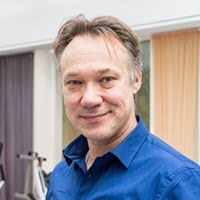
Margot Bochane
My dream is for every child to develop optimal communication skills. I contribute to this dream via lectures and research. I work at Hanze University of Applied Sciences, where I am teaching in the program of speech and language pathology in the School of Health Care Studies. Since 2021, I am also teaching in the Bachelor and the international Research Master (EMCL+) of Linguistics at the RUG. I have a PhD in Medical Sciences – Public Health Research.
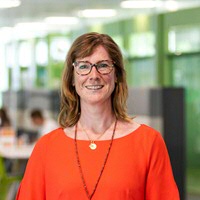
Susanne Scheibe
Susanne Scheibe is Professor in Organizational Psychology at the Faculty of Behavioral and Social Sciences of the University of Groningen, specializing in lifespan development and organizational behavior. She obtained her Ph.D. from Free University Berlin and subsequently worked as research scientist at the Max Planck Institute for Human Development (Germany) and Stanford University (USA). Scheibe’s research focuses on developmental changes in emotions and self-regulation during adulthood and the interplay with work conditions, occupational health, and the aging workforce. Key interests of her are understanding the emotional benefits of getting older at work, discovering the strengths and vulnerabilities of different age groups at work, and understanding how work conditions can be designed to support and foster work motivation, well-being, and effectiveness of employees at different ages and career stages.
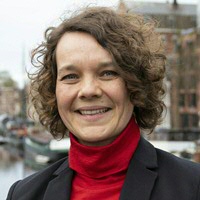
Jasperina Brouwer
Jasperina Brouwer, assistant professor, combines her educational background in social, health, and educational sciences with practical experience as a nurse in her research. Her research focuses on social mechanisms contributing to professional development and retention in nursing (funded by NWO Veni) and other professions (e.g., teachers or doctors). Proficient in both qualitative and quantitative research methods, her expertise lies in applying advanced (longitudinal) social network analysis techniques in student and professional networks. Employing a comprehensive mixed methods approach, she also delves into the impact of healthcare innovations, i.e. technological advancements combined with shifts in care delivery by formal and informal caregivers—on professional commitment, identity and development.
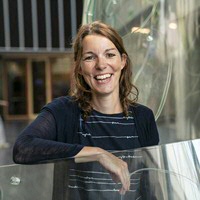
Job van 't Veer
Dr. Job van 't Veer is professor Digital Innovation in Healthcare at the NHL Stenden University of Applied Sciences. As a researcher, he is always focused on the social participation of vulnerable groups, such as people with mental illness, mild intellectual disorders, and dementia.
Since 2012, he has focused on digital innovation in healthcare and welfare. Within all research projects, the emphasis is on a design-research approach: how can you, together with clients, residents, and professionals, innovatively and possibly digitally, improve healthcare and welfare? Apart from supervising PhD-students in their design research projects, he is main author of the book ‘Ontwerpen voor Zorg en Welzijn’ (Design for Healthcare & Social Work), which is used in about 50 bachelor-programs in Dutch/Belgian Universities of Applied Sciences.
Job van ‘t Veer is co-program leader of SIA SPRONG FAITH research, a network of more than 40 healthcare organizations and companies that generates and shares knowledge on frailty. He is associated in many (Northern) networks and projects that involve the topic of health technology, like HEALTHNoord, HTRIC, AndersWerkenindeZorg, TZA Drenthe, NWA eHealth Junior, Bridge2Health, PIT and MEE Lab.

Geke Dijkstra
Geke Dijkstra is associate professor at the Talma Lectureship; living, welfare and care in old age, since May 2020. In this position she is committed to putting elderly care on the map. By developing and sharing new knowledge with (young) professionals, she wants to give the image of elderly care a major boost. It turns out that the image of the elderly and elderly care is not highly regarded among students which is why she tries to show young people (students) that elderly care in particular sharpens all your senses. That it’s an area in which all branches of care and welfare come together. Elderly care is generally more complex than work in other care areas, partly due to multimorbidity. She is also involved in learning networks around complex problems, in which professionals from different domains look for creative, less obvious solutions. In the program of ZONmw's “For Each Other” projects, she tries to share the added value that emerges from the projects with 21 patient organizations.
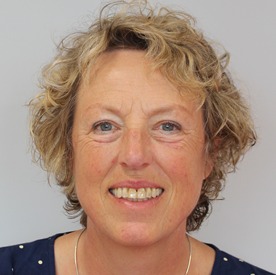
| Last modified: | 10 June 2024 12.40 p.m. |


